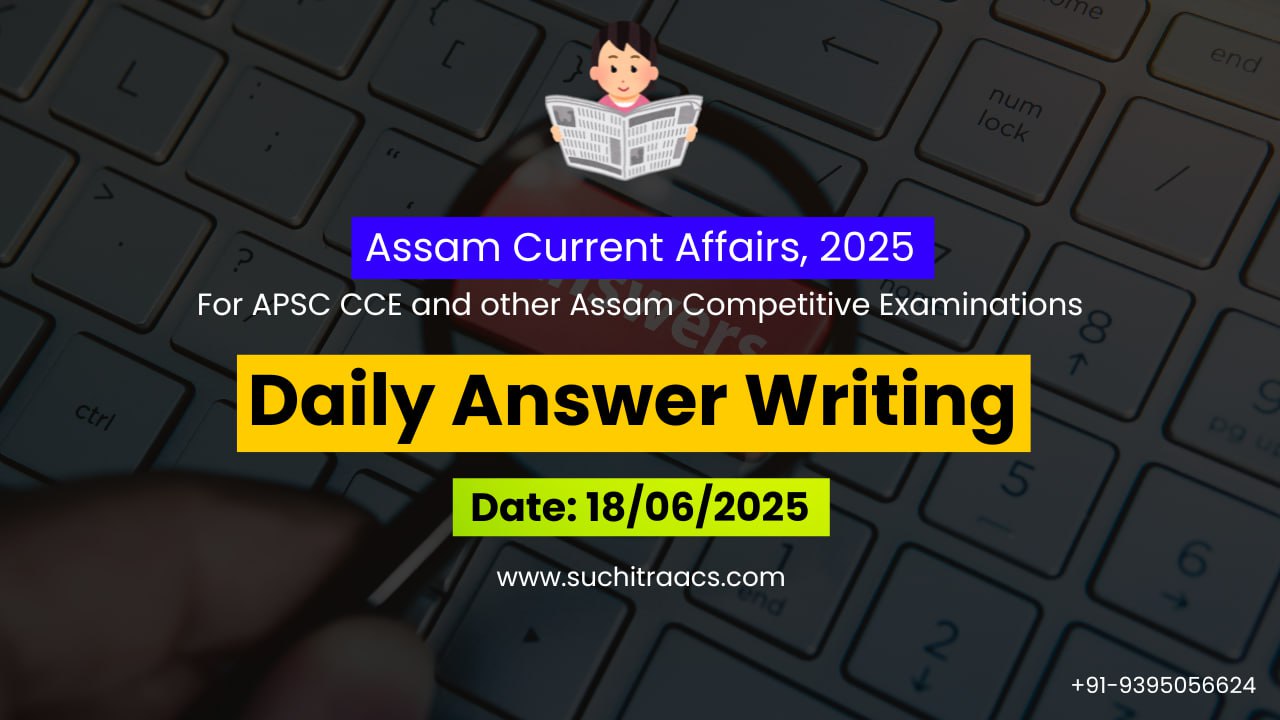APSC Answer Writing (Daily) based on Assam Tribune – 18/06/2025
For APSC CCE and other Assam Competitive examinations aspirants, practicing Daily Answer Writing is vital. This blog covers the most important Main question and its model Answer from the Assam Tribune today (18-06-2025).
📝 Mains Question:
Q. “The misuse of taxpayer-funded government advertisements erodes both governance ethics and electoral fairness.” Discuss the recent Supreme Court directive in this context and suggest a framework to ensure transparency in public communication.
📘 Model Answer
Introduction
Publicly funded advertisements are intended to inform citizens about welfare schemes, rights, and public services. However, when these are misused to promote political leaders or parties, they violate principles of political neutrality, fiscal accountability, and ethical governance. Recognising this, the Supreme Court recently reiterated its 2015 guidelines to curb such misuse, mandating strict oversight by regulatory committees in states.
Why Misuse of Government Advertisements is a Problem
| Concern | Impact |
| Violation of Public Trust | Turns welfare schemes into instruments of personal or party glorification |
| Electoral Unfairness | Creates undue advantage for ruling parties, distorting the level playing field |
| Waste of Public Money | Crores spent on image-building rather than critical outreach or service delivery |
| Undermines Democratic Values | Promotes a personality cult over institutional accountability |
| Transparency Deficit | Limited public access to ad budgets, approvals, and content audits |
Supreme Court’s Intervention (Common Cause v. Union of India, 2015)
- Prohibited use of leader images (except PM, CM, President, CJI)
- Mandated formation of a Content Regulation Committee (CRGA) in each state
- Emphasised non-partisan, factual communication
- Recently reaffirmed in 2025 due to violations in multiple states (including NE region)
Ethical Dimensions (GS Paper 4 Overlap)
- Integrity & Accountability: Use of state funds must be purpose-driven and justifiable
- Political Neutrality: Administrators must resist pressure to use resources for party propaganda
- Probity in Public Life: Leaders must avoid self-promotion using taxpayer money
- Transparency: Citizens have a right to know how their money is being spent
Way Forward: Framework for Ethical and Transparent Public Communication
| Area | Recommendation |
| Institutional Oversight | Strengthen and empower CRGAs with real-time veto powers |
| Audit Mechanisms | Annual CAG/State AG reports on ad expenditure across departments |
| Digital Dashboard | Public portal for accessing government ads, budgets, and approvals |
| Legal Backing | Amendments in Rules of Business to define ad ethics and penalties |
| Public Awareness | Educate citizens that schemes are their rights, not gifts from leaders |
Case Example: Assam Context
- Reports of excessive promotional hoardings for state schemes in past election cycles
- Civil society in Assam has previously petitioned for ad transparency
- Opportunity for Assam to become a model by enforcing SC norms strictly
Conclusion
The Supreme Court’s directive is a necessary judicial push to restore the ethical compass of public governance. Government communication must be informational, not ornamental. When political neutrality and fiscal accountability are upheld, democracy is strengthened, and public trust is earned.
✨ Looking for top-quality APSC Mains Guidance with Personalised Mentor?

🔔 Join Our WhatsApp Study Group!
For exclusive access to premium quality content, including study materials, current affairs, MCQs, and model answers for APSC CCE and other Assam competitive exams.
Click here to join: SuchitraACS Study WhatsApp Group
📚 Want to know more about SuchitraACS’s most affordable courses?
Click here to know more: SuchitraACS Courses for APSC CCE and Assam Competitive Examinations




